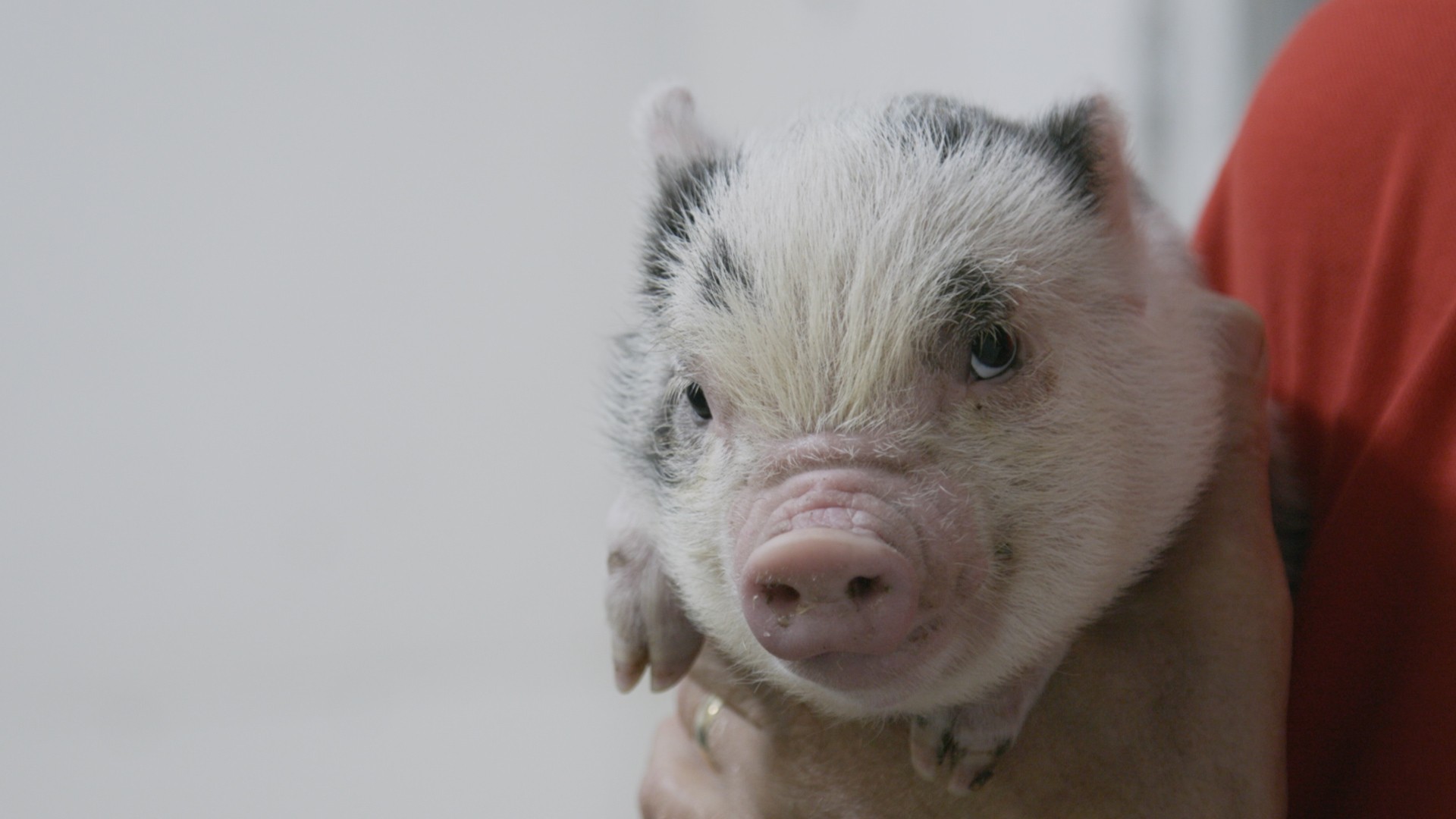David Attenborough is holding in the palm of his hand a rock that looks like a rotten avocado."It's always seemed to me that fossils are some of the most romantic things on this planet. I mean, if you came across a pebble like this for example and you just happened to knock it with a hammer and split it and it opened like that, wouldn't you think that was remarkable? And that hasn't seen the light of day for four hundred million years, and you're the first person ever to clap eyes on it."
Advertisement
This was two years ago, in an interview shortly after his 90th birthday. He told the story about riding his bicycle to quarries in Leicester, England as a boy, cracking rocks open to see the insides, one after another, looking at once-juicy millipedes.There is maybe no one else as permanently dazzled by where earth came from or where it’s going; no one as excited to inspect our raggedy edges, the shells and the oceans and the debris, the greasy fingerprints nature leaves on its own clothing. Our mistakes, our extinctions, our erosions.Last Saturday was the US premiere of Dynasties, which documents lots of the same hypnotic trajectories of animal lives, lifted to a pseudo-Shakespearean height by the narration of Attenborough, whose voice, even at 92, still has a cadence that sounds both mournful and astonished, as if he pulled open the refrigerator, and there it was, a growling lion cub, how did you get in here, my boy? He introduces some episodes standing near a jeep, in linen pants, standing tipped slightly to the side like a beach umbrella planted in the sand. Each of the six episodes focuses on one species and follows a troop or pack or pride for a few generations. The show is a biography of families, of a kind of royalty, patrolling the earth and warring with rivals—within its own species, other species, with mankind and the inevitability of environmental degradation. There is torment and dopey affection. They sleep for many hours. They huddle with snow on their backs.
Each of the six episodes focuses on one species and follows a troop or pack or pride for a few generations. The show is a biography of families, of a kind of royalty, patrolling the earth and warring with rivals—within its own species, other species, with mankind and the inevitability of environmental degradation. There is torment and dopey affection. They sleep for many hours. They huddle with snow on their backs.

Advertisement
Documentaries about animals have a tendency to turn the dial to glorious triumph, biblical confrontations between BEASTS THAT ROAM THE EARTH, but Dynasties is instead mostly about exhaustion, the hideous struggle, life in 36-hour increments. There are no thrones, no mountain tops.
In an episode which airs this Saturday about a chimpanzee uprising, the alpha male, David, leads his troop in search of a new territory, after a fire has destroyed theirs. Younger males harass David constantly. One night, driven mad by ovulating females, the rivals attack him. The next morning the camera scans along David’s body, crumpled on a bed of leaves, some of his fingers and toes have been bitten down to crusty little nubs. The infant chimps and the older females come to inspect him. The camera zooms in on one of the females, she opens her mouth and sweeps her tongue carefully through the bloody divot in his thigh, then the camera zooms out, all of them huddled over him, David’s monkey surgeons, craning their necks to watch each other work, and you can see his wrinkled eyelids begin to twitch. It feels deranged to call this sequence romantic, but if your house was burned to the ground so an agricultural conglomerate could use the land beneath it to harvest palm oil, and then your nemeses strategically chewed your body’s most valuable instruments so they could steal your wife, and then your family arrived like angels and wiped the dirt out of your blood and brought you back to life, well, what do you call that besides love?The grind, and that’s what this is, a frantic adrenaline bender from birth until, best case, you grow haggard and collapse, makes their death from deforestation and hunting somehow even more indecent.
Advertisement
In another episode, a lion hunt is shown not as some athletic poetry but a panting brawl in an attempt to suffocate a wildebeest. A lion’s existence is a miracle, every day; there is tedium and tense standoffs and blazing heat, and then their food travels hundreds of miles away in search of the rain. The manes are disgusting and torn, flies swarm to every wet gash in the skin on their face. They’re strikingly lean, and then only when they’re on the brink of starvation do they catch something and eat it and swell to the size of beanbag chairs and sleep on their backs like nauseous lords.The grind, and that’s what this is, a frantic adrenaline bender from birth until, best case, you grow haggard and collapse, makes their death from deforestation and hunting somehow even more indecent. But “Dynasties” does not seek to proselytize or to condemn the oil-executive heirs from Texas with receding hairlines, stretching slain bears out like Playboy centerfolds; the wheezing red-cheeked hoteliers; the dentists from Minnesota with fat foreheads; the cross-eyed sons of real estate conmen, kneeling behind the corpses of heavy, slow animals they courageously ambushed with all-terrain vehicles and high-powered rifles. Those men are unreachable, their minds a grim arcade of faux heroisms, they are people who believe in The Food Chain as an unambiguous ethical rubric, people who believe propaganda theories like Actually, Murdering Trophy Animals Is Good, For Conservation. People who talk about the Thrill of the Hunt and Apex Predators with the sweaty lust of a teenage boy home alone, and how humans are the most Apex Predators of all, because of somethingsomething we have canine teeth.
Advertisement
Dynasties treats those men and their impulses and the commercial industries who raze the animals’ habitats as something understood and foregone, a terminal illness, and alludes to them only with the vague “dwindling numbers,” or when a pride of lions is poisoned by eating domestic cattle, whose herders have intentionally infected the cattle for that very purpose.Animals’ survival, against even just natural dangers, feels impossible, but they do, they are heroes. For them to disappear takes only man’s fantasies of combat and moderate wealth to bring it to life. They say nature is fragile; nature is relentless and resurrects itself constantly, bullets and machines are just very strong and our appetites are grotesque.Dynasties celebrates these animals simply because they are a gorgeous and weird thing on our planet, desperate to make it; they are not just like us but they are also not nihilist monsters with no philosophies, they came from a long line of animals just like them, each generation microscopically wiser and more refined. Their reason for living, scientifically, is to be a little better tomorrow.The idea of a dynasty, a legacy, is the implication of earth’s future.
I feel this way lately, maybe you feel it too, this dull-ache ambivalence about many things, because the earth is disintegrating and now the polar bears paddle forever, bony and deflated-looking, in search of food and ice, because the government is run by pit bosses and loan sharks and grinning ex-lobbyists, that the bridge this train is rolling across breaks off up ahead and we can see it from here and the man at the controls is asleep, and he’s not even a real conductor, it’s a scarecrow with a pot on his head, and soon the rainforest will be buzzed to its ankles and the seas will warm from pole to pole into microwaved diner gravy and cities will burble down beneath it.
Advertisement
There are hundreds of videos on YouTube of African safaris, filmed by tourists, gasping and looking at animals. I watch every one I can find. Jaguars staring at porcupines like crossword puzzles. Zebras migrating across rivers. Lions slinking against jeep tires, with buffalo blood on their noses, the guides whispering and turning off the engines. I watch them before bed, at airports, when I mean to open a tutorial to repair the router, but then there it is in the suggestions, 14 minutes of elephants wading through tall, crunchy grass.I like watching them because the animals are sincere, they have a logic; they are, it has to be said, profoundly boring, but in a way that is so separate from human contemplations that it achieves a Zen beauty. They are not modest or subtle or ashamed. Rhinoceroses urinate at a volume and velocity that could only be described as meteorological. Chimpanzees get so horny it makes them dizzy and rip trees from the ground. Animals know fear but only as in, like, crocodiles, not existential doom. They are frantic for water and warmth but they don’t stress about meaning. All their movements and decisions are dense with purpose. Lions sleep so they can hunt and they hunt so they can eat. There is an imminent-ness, always, even in laziness, of something important and ferocious, birth and death and consumption, rituals that feel both maniac and yet rehearsed.There's a scene in one episode, where one juvenile male lion, ripped-up with a patchy mane and a gray face, like something dead and then zombified, is surrounded by hyenas. They're tearing at him, howling and waiting for him to give up. It seems the lion won’t make it, there’s no way, there are holes in his torso. But then, another lion trots in to rescue him, the hyenas scatter, the lions flop on top of each other in the grass. Soon after, Attenborough tells us, the two lions are driven from their pride, now old enough to start one of their own. They’re never seen again. Somewhere else they will grow thick and terrifying and wise, then eventually they will die, and vultures or hyenas or tiny foxes will pluck out their eyes and then all those vultures and hyenas will die, too. The idea of a dynasty, a legacy, is the implication of earth’s future. Death is certain, and something we can fathom, if there is a place at least to leave some bones behind.Sign up for our newsletter to get the best of VICE delivered to your inbox daily.Follow John Saward on Twitter.
